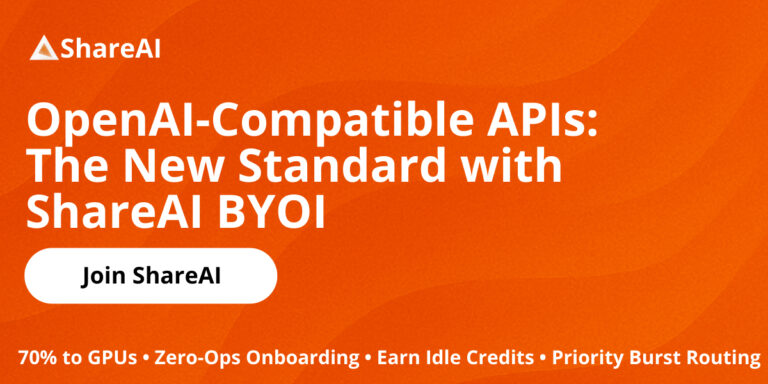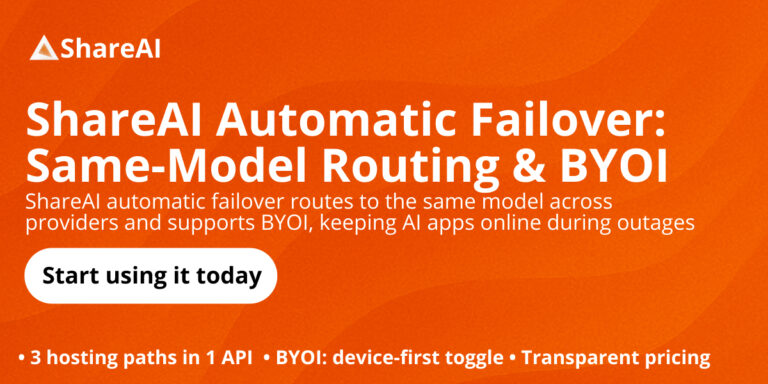TensorBlock Forge Alternatives 2026: Top 10
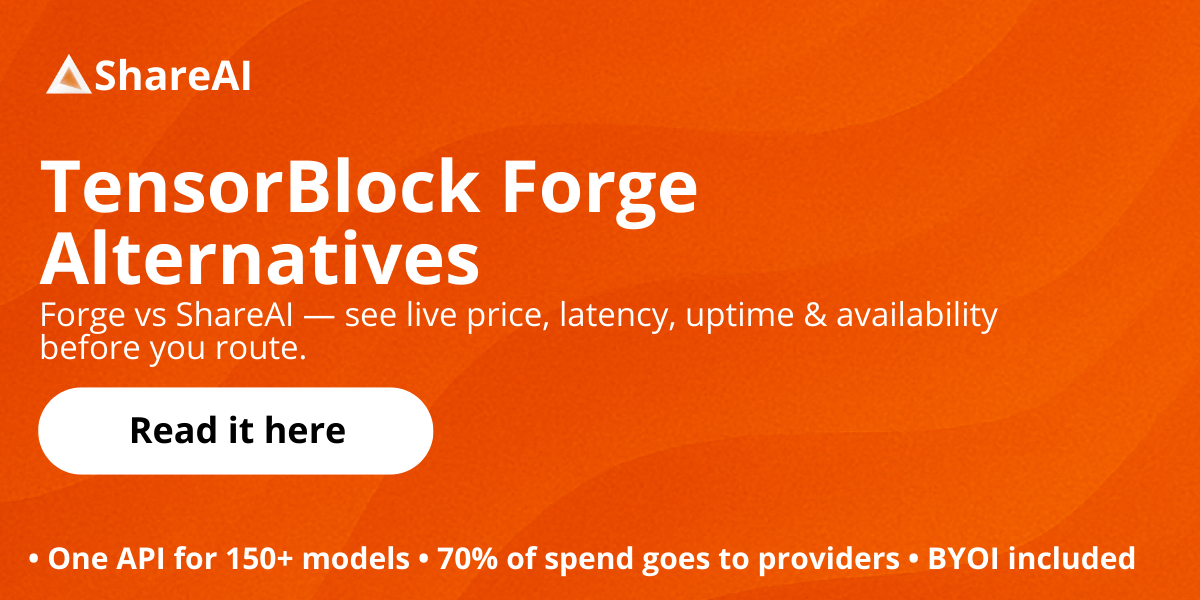
Updated February 2026
If you’re searching for a TensorBlock Forge alternatives, this guide compares the 10 best options the way a builder would. First, we clarify what TensorBlock Forge is—then we map credible substitutes across aggregators, gateways, orchestration tools, and SDK proxies. We place ShareAI first for teams that want one API across many providers, transparent marketplace data (price, latency, uptime, availability, provider type) before routing, instant failover, and people-powered economics (70% of spend flows to providers).
Quick links
What TensorBlock Forge is (and isn’t)
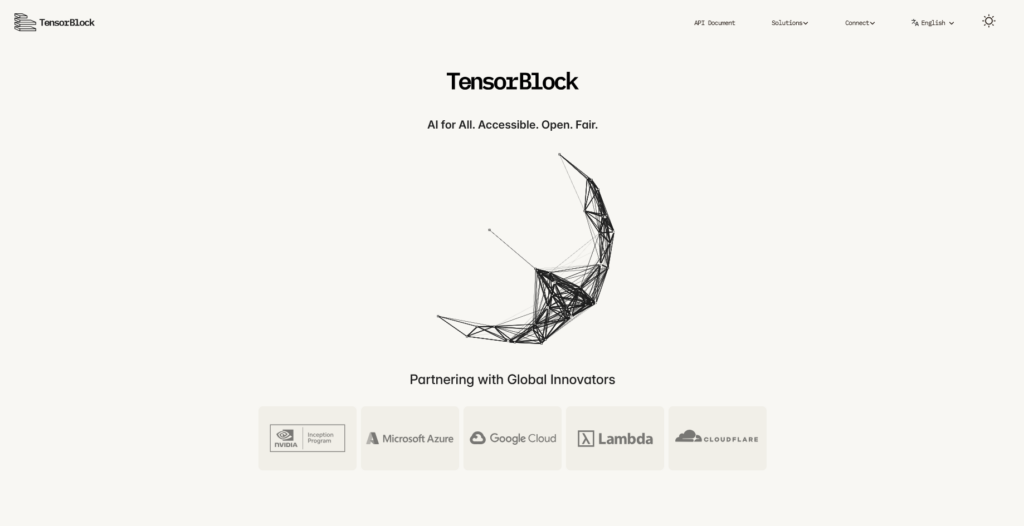
TensorBlock Forge presents itself as a unified AI API that helps developers access and orchestrate models across providers with one secure key, emphasizing intelligent routing, enterprise-grade encryption, automated failover, and real-time cost control. That’s a control-and-routing layer for multi-provider LLM use—not a transparent model marketplace you can browse before you route.
Aggregators vs Gateways vs Orchestrators vs SDK proxies
LLM aggregators (e.g., ShareAI, OpenRouter, Eden AI): one API across many models/providers with pre-route transparency (price, latency, uptime, availability, provider type) and smart routing/failover.
AI gateways (e.g., Traefik AI Gateway, Kong, Apache APISIX, Apigee): policy/governance at the edge (credentials, rate limits, guardrails), plus observability. You bring the providers; they enforce and observe.
Agent/orchestration platforms (e.g., Orq, Unify): flow builders, quality evaluation, and collaboration to move from experiments to production.
SDK proxies (e.g., LiteLLM): a lightweight proxy/OpenAI-compatible surface that maps to many providers; great for DIYers and self-hosting.
Where Forge fits: “Unified API with routing & control” overlaps parts of aggregator and gateway categories, but it’s not a transparent, neutral marketplace that exposes live price/latency/uptime/availability before you route traffic.
How we evaluated the best TensorBlock Forge alternatives
- Model breadth & neutrality — proprietary + open models; easy switching without rewrites.
- Latency & resilience — routing policies, timeouts, retries, instant failover.
- Governance & security — key handling, scopes, regional routing.
- Observability — logs/traces and cost/latency dashboards.
- Pricing transparency & TCO — compare real costs before you route.
- Developer experience — clear docs, SDKs, quickstarts; time-to-first-token.
- Community & economics — whether your spend grows supply (incentives for GPU owners and companies).
Top 10 TensorBlock Forge alternatives
#1 — ShareAI (People-Powered AI API)
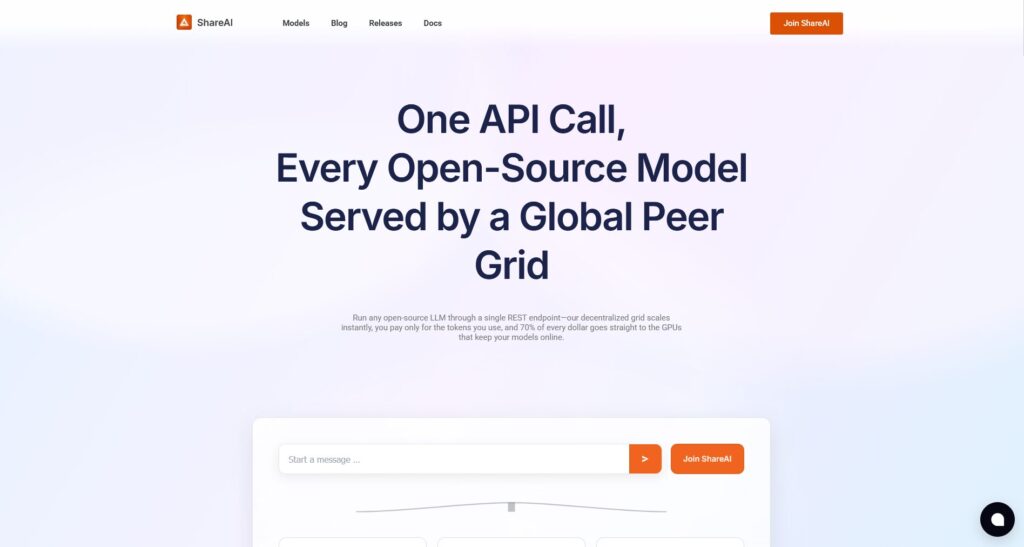
What it is. A multi-provider API with a transparent marketplace and smart routing. With one integration, you can browse a broad catalog of models and providers, compare price, latency, uptime, availability, provider type, and route with instant failover. The economics are people-powered: 70% of every dollar flows to providers (community or company) who keep models online.
Why it’s #1 here. If you want provider-agnostic aggregation with pre-route transparency and resilience, ShareAI is the most direct fit. Keep a gateway if you need org-wide policies; add ShareAI for marketplace-guided routing.
- One API → large catalog across many providers; no rewrites, no lock-in.
- Transparent marketplace: choose by price, latency, uptime, availability, provider type.
- Resilience by default: routing policies + instant failover.
- Fair economics: 70% of spend goes to providers (community or company).
Try these next: Browse Models · Open Playground · Create API Key · API Reference
For providers: earn by keeping models online. Onboard via Windows, Ubuntu, macOS, or Docker. Contribute idle-time bursts or run always-on. Choose your incentive: Rewards (money), Exchange (tokens/AI Prosumer), or Mission (donate a % to NGOs). As you scale, you can set your own inference prices and gain preferential exposure.
#2 — OpenRouter
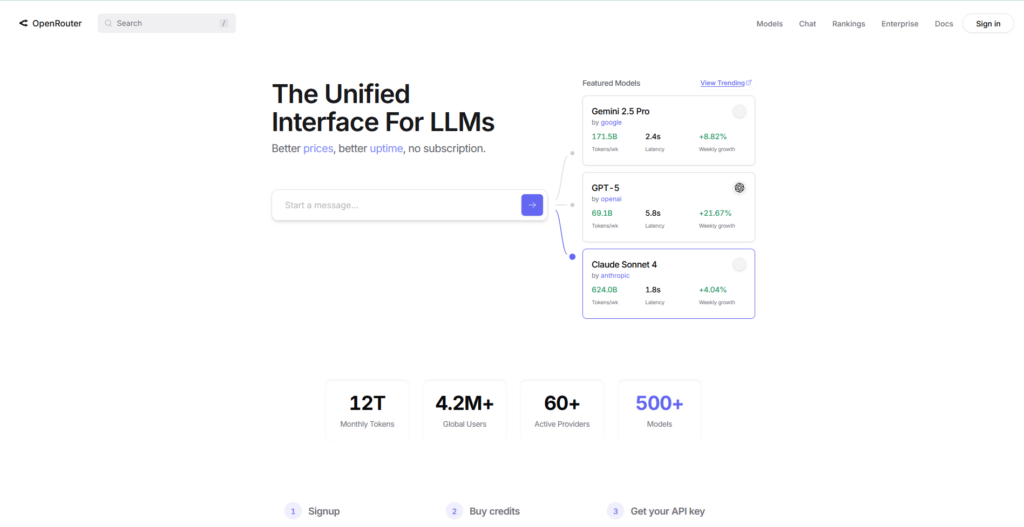
What it is. A unified API over many models; great for fast experimentation across a wide catalog.
Best for. Developers who want to try many models quickly with a single key.
Why consider vs Forge. Broader model variety out of the box; pair with ShareAI for marketplace stats and failover.
#3 — Portkey
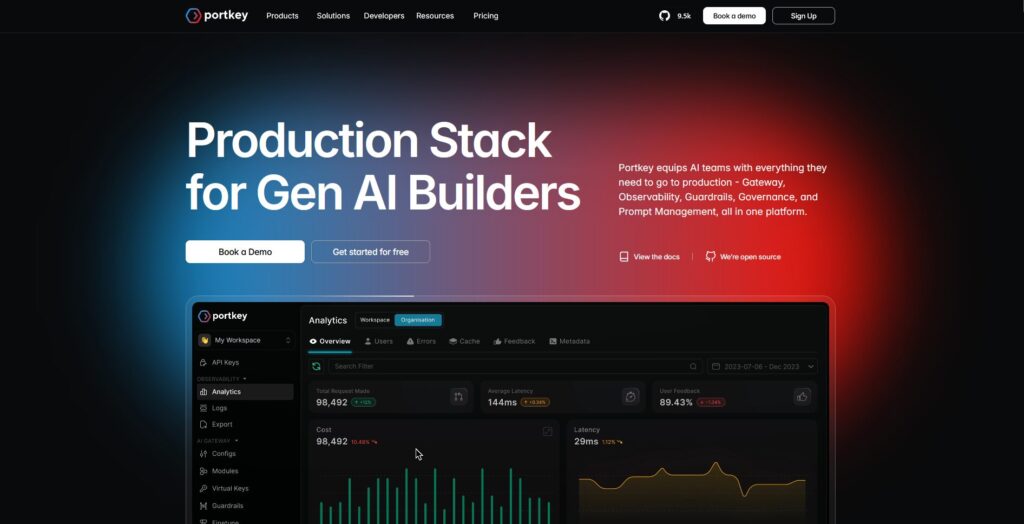
What it is. An AI gateway emphasizing observability, guardrails, and enterprise governance.
Best for. Regulated industries needing deep policy controls.
Why consider vs Forge. If governance and observability are your top priorities, Portkey shines; add ShareAI for transparent routing.
#4 — Kong AI Gateway
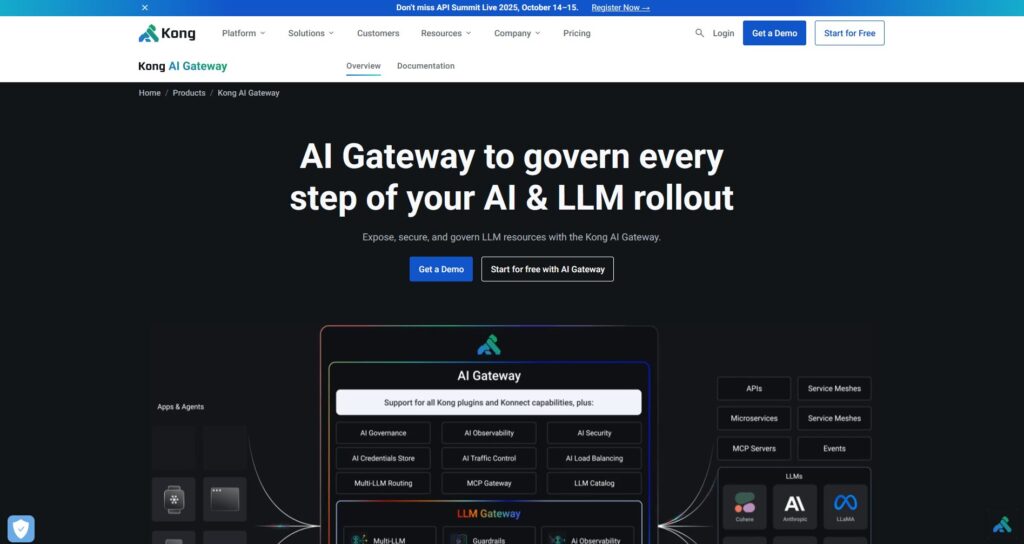
What it is. Enterprise API gateway with AI/LLM traffic features—policies, plugins, analytics at the edge.
Best for. Platform teams standardizing egress controls.
Why consider vs Forge. Strong edge governance; pair with ShareAI for marketplace-guided multi-provider selection.
#5 — Eden AI
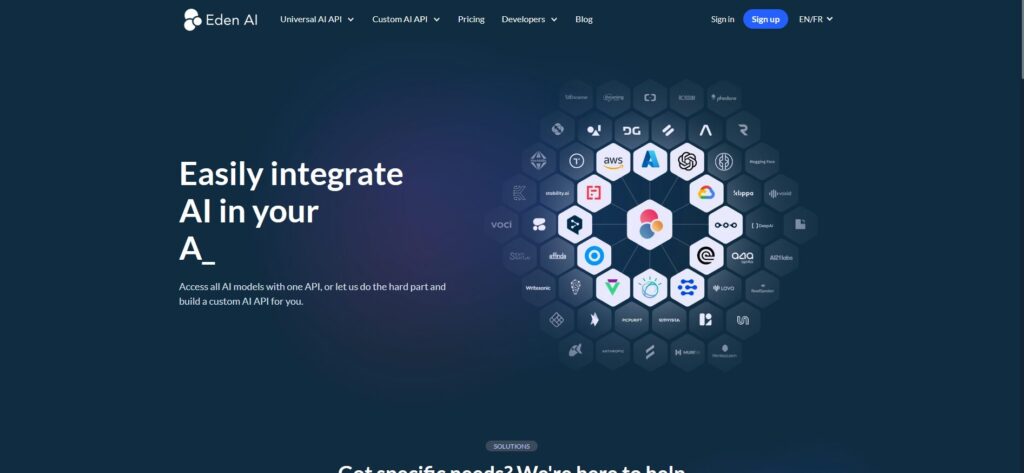
What it is. An aggregator that covers LLMs plus broader AI (image, translation, TTS), with fallbacks and caching.
Best for. Teams that need multi-modality in one API.
Why consider vs Forge. Wider AI surface area; ShareAI remains stronger on transparency before routing.
#6 — LiteLLM
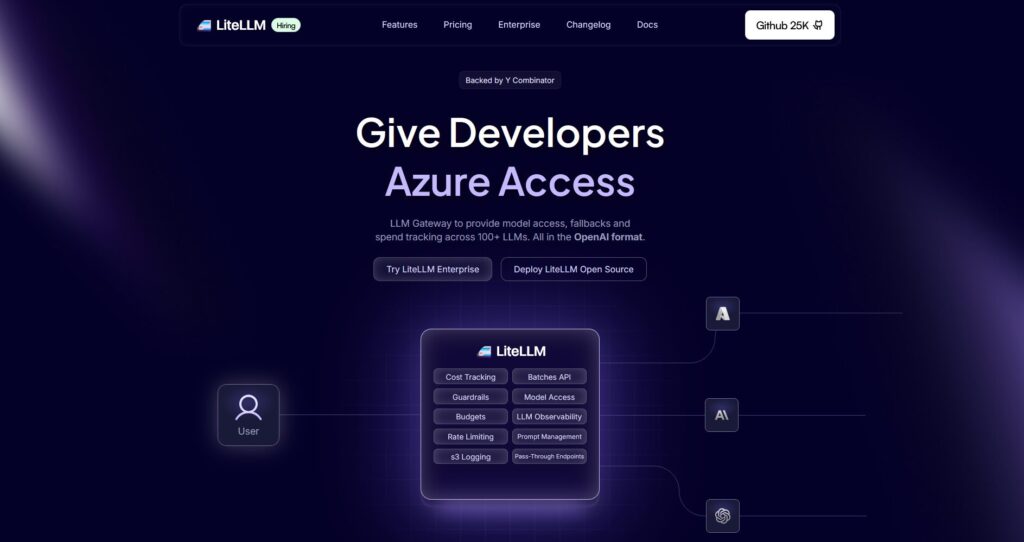
What it is. A lightweight Python SDK and optional self-hosted proxy exposing an OpenAI-compatible interface across providers.
Best for. DIY builders who want a proxy in their stack.
Why consider vs Forge. Familiar OpenAI surface and developer-centric config; pair with ShareAI to offload managed routing and failover.
#7 — Unify
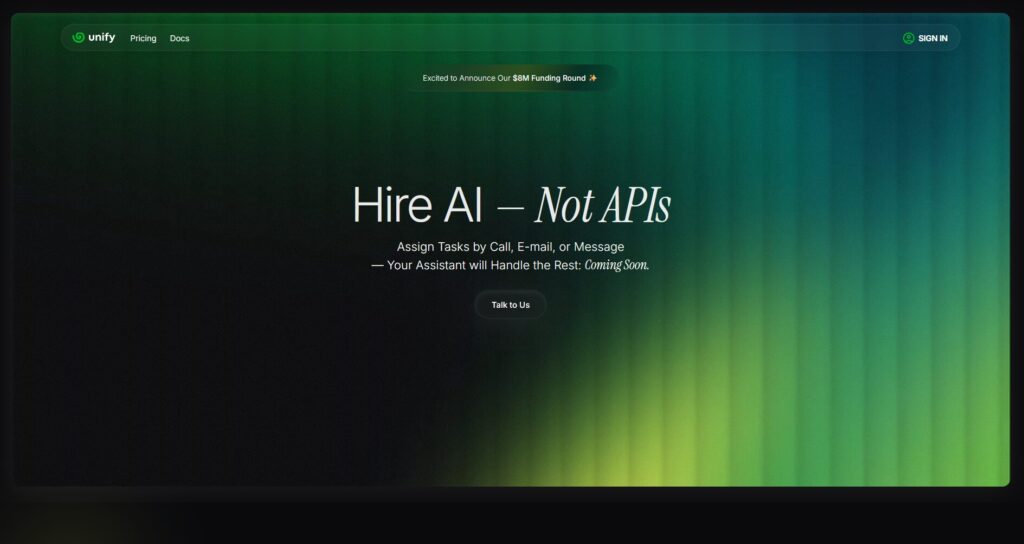
What it is. Quality-oriented routing & evaluation to pick better models per prompt.
Best for. Teams pursuing measurable quality gains (win rate) across prompts.
Why consider vs Forge. If “pick the best model” is the goal, Unify’s evaluation tooling is the focus; add ShareAI when you also want live marketplace stats and multi-provider reliability.
#8 — Orq
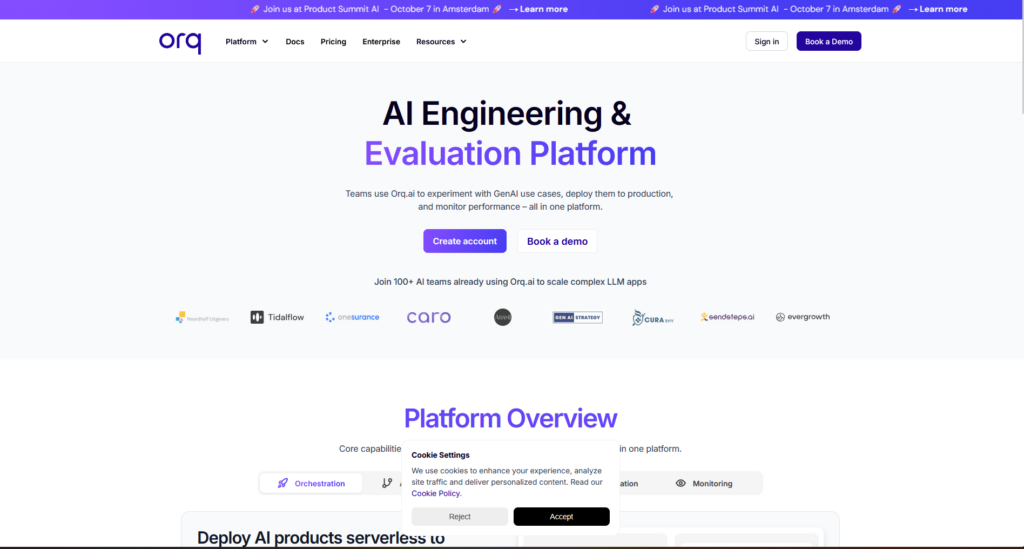
What it is. Orchestration & collaboration platform to move from experiments to production with low-code flows.
Best for. Teams building workflows/agents that span multiple tools and steps.
Why consider vs Forge. Go beyond an API layer into orchestrated flows; pair with ShareAI for neutral access and failover.
#9 — Traefik AI Gateway
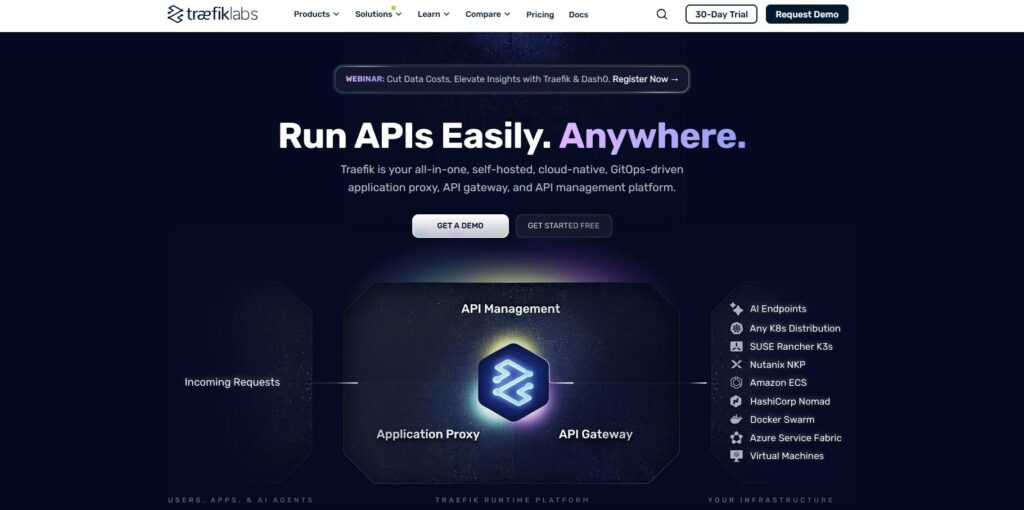
What it is. A governance-first gateway—centralized credentials and policy with OpenTelemetry-friendly observability and specialized AI middlewares (e.g., content controls, caching).
Best for. Orgs standardizing egress governance on top of Traefik.
Why consider vs Forge. Thin AI layer atop a proven gateway; add ShareAI to choose providers by price/latency/uptime/availability and route resiliently.
#10 — Apache APISIX
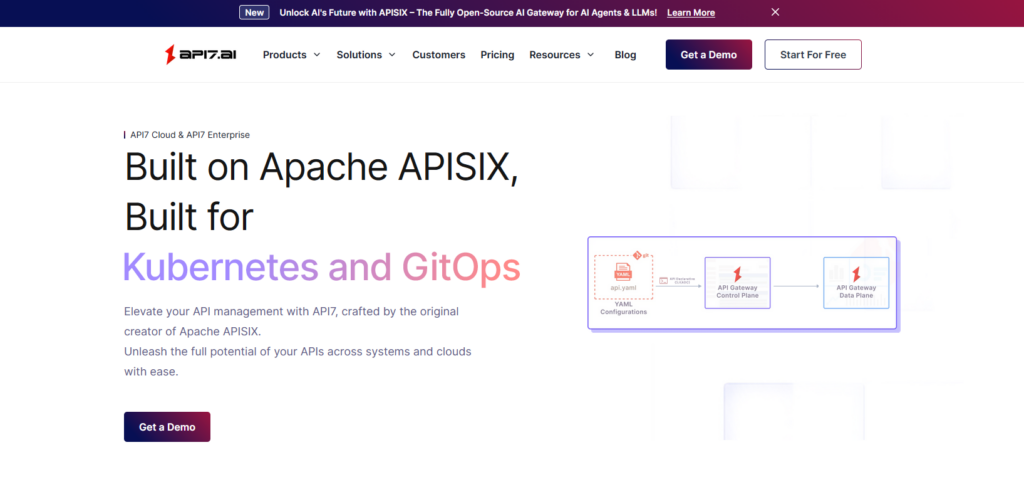
What it is. A high-performance open-source API gateway with extensible plugins and traffic policies.
Best for. Teams that prefer open-source DIY gateway control.
Why consider vs Forge. Fine-grained policy and plugin model; add ShareAI to get marketplace transparency and multi-provider failover.
TensorBlock Forge vs ShareAI
If you need one API over many providers with transparent pricing/latency/uptime/availability and instant failover, choose ShareAI. If your top requirement is egress governance—centralized credentials, policy enforcement, and deep observability—Forge positions itself closer to control-layer tooling. Many teams pair them: gateway/control for org policy + ShareAI for marketplace-guided routing.
Quick comparison
| Platform | Who it serves | Model breadth | Governance & security | Observability | Routing / failover | Marketplace transparency | Provider program |
|---|---|---|---|---|---|---|---|
| ShareAI | Product/platform teams seeking one API + fair economics | Wide catalog across many providers | API keys & per-route controls | Console usage + marketplace stats | Smart routing + instant failover | Yes (price, latency, uptime, availability, provider type) | Yes — open supply; 70% to providers |
| TensorBlock Forge | Teams wanting unified API + control | BYO providers | Centralized key handling | Runtime analytics (varies by setup) | Conditional routing, failover | No (tooling layer, not a marketplace) | n/a |
| OpenRouter | Devs wanting one key across many models | Wide catalog | Basic API controls | App-side | Fallbacks | Partial | n/a |
| Portkey | Regulated/enterprise teams | Broad | Guardrails & governance | Deep traces | Conditional routing | Partial | n/a |
| Kong AI Gateway | Enterprises needing gateway policy | BYO | Strong edge policies/plugins | Analytics | Proxy/plugins, retries | No (infra) | n/a |
| Eden AI | Multi-service AI (LLM + vision/TTS) | Broad | Standard controls | Varies | Fallbacks/caching | Partial | n/a |
| LiteLLM | DIY/self-host proxy | Many providers | Config/key limits | Your infra | Retries/fallback | n/a | n/a |
| Unify | Quality-driven teams | Multi-model | Standard API security | Platform analytics | Best-model selection | n/a | n/a |
| Orq | Orchestration-first teams | Wide support | Platform controls | Platform analytics | Orchestration flows | n/a | n/a |
| Traefik / APISIX | Enterprises / DIY | BYO | Policies | Add-ons/custom | Custom | n/a | n/a |
Want to compare live prices and latency before routing? Start with the Model Marketplace and send your first request from the Playground.
Browse Models · Open Playground
Pricing & TCO: compare real costs (not just unit prices)
Raw dollars per 1K tokens rarely tell the whole story. Effective TCO shifts with retries/fallbacks, latency (affects user behavior), provider variance, observability storage, and evaluation runs. A transparent marketplace helps you choose routes that balance cost and UX.
TCO ≈ Σ (Base_tokens × Unit_price × (1 + Retry_rate))
+ Observability_storage
+ Evaluation_tokens
+ Egress
- Prototype (~10k tokens/day): Optimize for time-to-first-token. Use the Playground and quickstarts.
- Mid-scale (~2M tokens/day): Marketplace-guided routing/failover can trim 10–20% while improving UX.
- Spiky workloads: Expect higher effective token costs from retries during failover; budget for it.
Migration guide: moving to ShareAI
From TensorBlock Forge
Keep any control-layer policies where they shine; add ShareAI for marketplace routing and instant failover. Pattern: control-layer auth/policy → ShareAI route per model → measure marketplace stats → tighten policies.
From OpenRouter
Map model names, verify prompt parity, then shadow 10% of traffic and ramp 25% → 50% → 100% as latency/error budgets hold. Marketplace data makes provider swaps straightforward.
From LiteLLM
Replace the self-hosted proxy on production routes you don’t want to operate; keep LiteLLM for dev if desired. Compare ops overhead vs. managed routing benefits.
From Unify / Portkey / Orq / Kong / Traefik / APISIX
Define feature-parity expectations (analytics, guardrails, orchestration, plugins). Many teams run hybrid: keep specialized features where they’re strongest; use ShareAI for transparent provider choice and resilient failover.
Developer quickstart (copy-paste)
The following use an OpenAI-compatible surface. Replace YOUR_KEY with your ShareAI key—get one at Create API Key.
#!/usr/bin/env bash
# cURL (bash) — Chat Completions
# Prereqs:
# export SHAREAI_API_KEY="YOUR_KEY"
curl -X POST "https://api.shareai.now/v1/chat/completions" \
-H "Authorization: Bearer $SHAREAI_API_KEY" \
-H "Content-Type: application/json" \
-d '{
"model": "llama-3.1-70b",
"messages": [
{ "role": "user", "content": "Give me a short haiku about reliable routing." }
],
"temperature": 0.4,
"max_tokens": 128
}'
// JavaScript (fetch) — Node 18+/Edge runtimes
// Prereqs:
// process.env.SHAREAI_API_KEY = "YOUR_KEY"
async function main() {
const res = await fetch("https://api.shareai.now/v1/chat/completions", {
method: "POST",
headers: {
"Authorization": `Bearer ${process.env.SHAREAI_API_KEY}`,
"Content-Type": "application/json"
},
body: JSON.stringify({
model: "llama-3.1-70b",
messages: [
{ role: "user", content: "Give me a short haiku about reliable routing." }
],
temperature: 0.4,
max_tokens: 128
})
});
if (!res.ok) {
console.error("Request failed:", res.status, await res.text());
return;
}
const data = await res.json();
console.log(JSON.stringify(data, null, 2));
}
main().catch(console.error);
Docs & tools: Docs Home · API Reference · Open Playground · Sign in / Sign up
Security, privacy & compliance checklist (vendor-agnostic)
- Key handling — rotation cadence; minimal scopes; environment separation.
- Data retention — where prompts/responses are stored, for how long; redaction defaults.
- PII & sensitive content — masking; access controls; regional routing for data locality.
- Observability — prompt/response logging; ability to filter or pseudonymize; propagate trace IDs consistently.
- Incident response — escalation paths and provider SLAs.
FAQ — TensorBlock Forge vs other competitors
TensorBlock Forge vs ShareAI — which for multi-provider routing?
Choose ShareAI. It’s built for marketplace transparency (price, latency, uptime, availability, provider type) and resilient routing/failover across many providers. Use a gateway/control layer when org-wide policy/observability is your top need, and pair it with ShareAI for transparent provider choice.
TensorBlock Forge vs OpenRouter — quick multi-model access or marketplace transparency?
OpenRouter makes multi-model access quick; ShareAI adds pre-route transparency and instant failover. If you want to choose routes by hard data (price/latency/uptime/availability), ShareAI leads.
TensorBlock Forge vs Eden AI — many AI services or focused LLM routing?
Eden AI covers LLMs plus vision/translation/TTS. If you mainly need transparent provider choice and robust failover for LLMs, ShareAI fits better.
TensorBlock Forge vs LiteLLM — self-host proxy or managed routing?
LiteLLM is a DIY proxy you operate. ShareAI provides managed aggregation with marketplace stats and instant failover—no proxy to run.
TensorBlock Forge vs Portkey — who’s stronger on guardrails/observability?
Portkey emphasizes governance and deep traces. If you also want price/latency transparency and resilient multi-provider routing, add ShareAI.
TensorBlock Forge vs Kong AI Gateway — gateway controls or marketplace?
Kong is a strong policy/analytics gateway. ShareAI is the marketplace/aggregation layer that picks providers based on live data and fails over instantly.
TensorBlock Forge vs Traefik AI Gateway — egress governance or routing intelligence?
Traefik focuses on centralized credentials and observability. ShareAI excels at provider-agnostic routing with marketplace transparency—many teams use both.
TensorBlock Forge vs Unify — quality-driven selection or marketplace routing?
Unify focuses on evaluation-driven best-model selection. ShareAI adds marketplace stats and multi-provider reliability; they complement each other.
TensorBlock Forge vs Orq — orchestration vs routing?
Orq orchestrates flows and agents; ShareAI gives you the neutral provider layer with transparent stats and failover.
TensorBlock Forge vs Apache APISIX — open-source gateway vs transparent marketplace?
APISIX gives DIY policies/plugins. ShareAI provides pre-route transparency and managed failover; pair both if you want fine-grained gateway control with marketplace-guided routing.
TensorBlock Forge vs Apigee — API management vs AI-specific routing?
Apigee is broad API management. For AI use, ShareAI adds the marketplace view and multi-provider resilience that Apigee alone doesn’t provide.
Try ShareAI next
Sources
TensorBlock site overview and positioning: tensorblock.co
